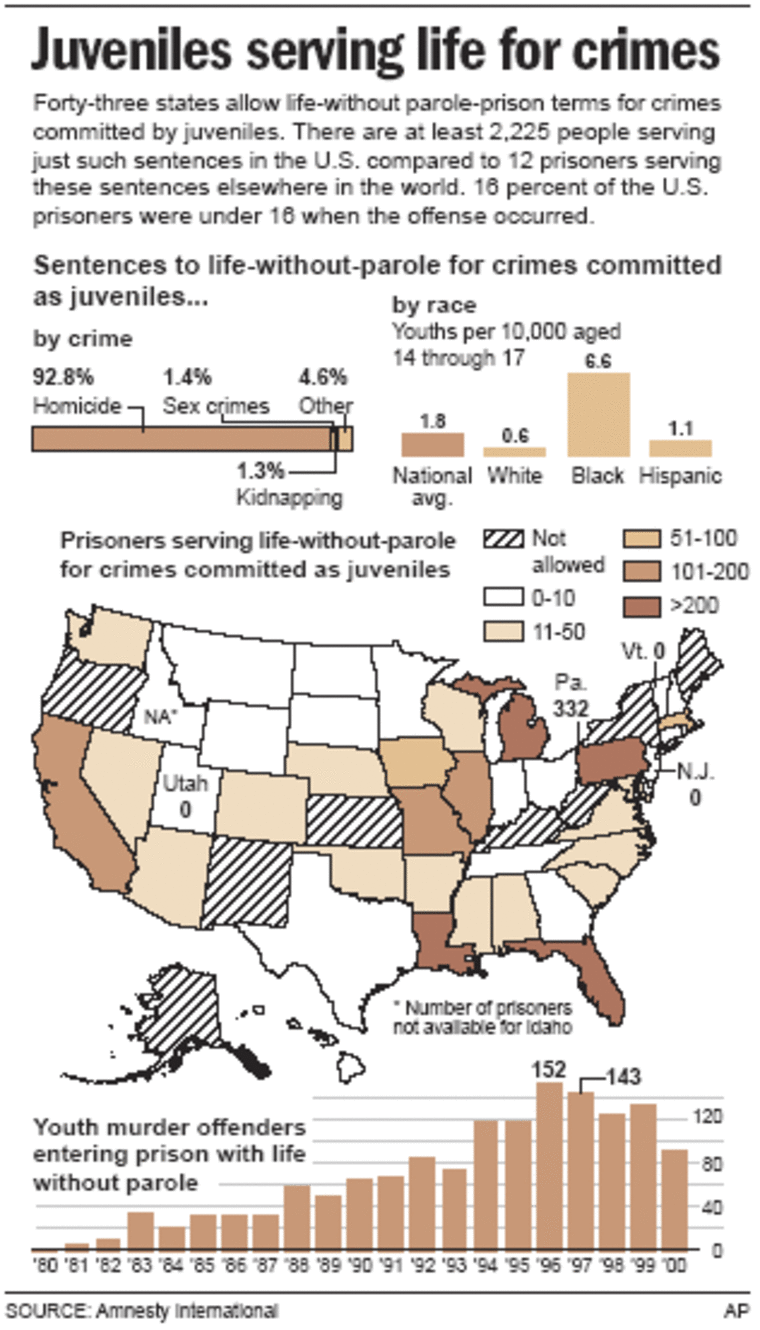There are 2,225 people serving life terms in prison without parole for crimes committed as children, most of them in a handful of states where judges don’t have the discretion to impose lighter penalties.
A report being released Wednesday by Amnesty International USA and Human Rights Watch found that a surge in violent crime in the late 1980s and early 1990s led to tougher sentencing laws and a jump in the number of juveniles sent to prison for the rest of their lives.
Pennsylvania has the most such inmates (332), followed by Louisiana (317), Michigan (306) and Florida (273). All four states have laws making life without parole mandatory for certain crimes and don’t allow judges to lighten sentences.
“Kids who commit serious crimes shouldn’t go scot-free,” said Alison Parker, senior researcher for New York-based Human Rights Watch. “But if they are too young to vote or buy cigarettes, they are too young to spend the rest of their lives behind bars.”
The groups say the sentence amounts to cruel and unusual punishment for criminals who may not be mature enough to grasp the consequences of their actions. They want the United States to abolish the penalty, which is allowed in 43 states but imposed in only a handful of other countries.
Earlier this year, the Supreme Court ruled that executing juvenile killers was unconstitutional, based in part on international sentiment that youths are less culpable than adults.
Some say sentences are deterrent
Dianne Clements, president of the Houston-based Justice for All, a victims advocacy group, said taking away life-without-parole sentences would remove a strong deterrent to crime.
“Judges don’t legislate, legislative bodies do. They legislate based on the will of the people, and that will says life without parole is an appropriate punishment,” she said.
According to the study, which analyzes state and federal data, 93 percent of youth offenders sentenced to life without parole were convicted of murder. Fifty-nine percent had no prior convictions, and 16 percent were 15 or under, factors that in states where judges are given flexibility could result in lesser sentences.
In 1990, 2,234 children were convicted of murder, of whom 2.9 percent were sentenced to life without parole. By 2000, even though the number of youth killers had dropped to 1,006, life-without-parole sentences had increased to 9 percent of the total.
The report attributed the increase to a spike in youth crime rates that resulted in tougher state sentencing laws that were passed and more vigorously enforced in the 1990s. Pennsylvania was among them, giving its prosecutors the power to file charges against youth offenders in adult court.
Call for flexibility
William Schulz, executive director of Amnesty International USA, said the figures show a need to give judges flexibility. He noted that among the 43 states that allow the penalty, the five states that impose it least frequently — Indiana, Ohio, New Jersey, Utah and Vermont — allow discretionary sentencing.
“Untie the hands of state and federal judges and prosecutors,” Schulz said. “Give them options other than turning the courts into assembly lines that mass produce mandatory life-without-parole sentences for children.”
The states that do not allow life-without-parole sentences for juveniles are Alaska, Kansas, Kentucky, Maine, New Mexico, New York and West Virginia. The District of Columbia also does not allow them.
